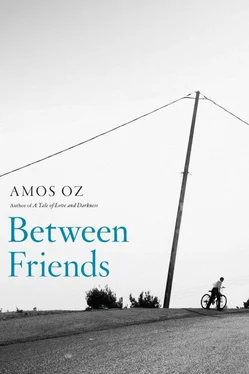From the time she was a child, Edna had been closer to Nahum than to her mother. Although she rarely expressed this closeness in words, Nahum always knew, from some unspoken mutual understanding, what to ask and what not to ask, when to concede and when to stand his ground. Since her mother’s death, Edna had taken it upon herself to drop off her father’s clothes at the laundry every Monday and return with a bundle of clean, ironed clothes every Friday; or she would sew on missing buttons for him. Since her brother’s death, she came to his apartment every day in the late afternoon, made them coffee, and sat with him for an hour or so. They spoke very little, usually just about her studies or his work. Sometimes they talked about a book. They listened to music together. Peeled and ate fruit. After the hour had passed, she would get up, take the cups to the sink, but would leave them for her father to wash after she had left for the school dormitory. Though Nahum knew almost nothing about her social life, he did know that her teachers were pleased with her, and he was proud that she’d learned Arabic on her own. A quiet girl, they said about her on the kibbutz, not impetuous like her mother, but devoted and diligent, like her father. What a shame she had cut off her braids for a short bob with bangs. With her hair braided and parted down the middle, she had looked just like one of those pioneer girls of an earlier generation.
One evening several months before, Nahum had gone to look for her in her dorm room to bring her a sweater she had left in his apartment. He found her with two of her girlfriends sitting on their beds, all playing recorders, practicing a simple scale over and over again. As he came in, he apologized for interrupting, then laid the folded sweater on the corner of the bed, brushed a speck of invisible dust off the table, apologized again, and tiptoed away. Outside, he stood under their window in the dark for five minutes and listened: they were now playing a light, lengthy etude that repeated itself in a melancholy way. His heart suddenly clenched. He walked to his apartment, sat down, and listened to the radio until his eyes closed. At night, half awake, he heard the jackals howling close by, as if they were right under his window.
On Tuesday when he came home from work, Nahum showered, got dressed in his ironed khaki trousers and a light-blue shirt, put on the short, shabby coat that gave him the air of a poor intellectual from the previous century, polished his glasses with the corner of his handkerchief, and started for the door. Suddenly he remembered the advanced Arabic textbook that Edna had left in his apartment. He wrapped the book carefully in a plastic bag, tucked it under his arm, put on his gray cap, and left the house. Vestiges of rain were still visible in the small puddles and on the fragrant, glistening leaves of the trees. Since he was in no hurry, he took a longer path that meandered past the children’s house. He still didn’t know what he would say to his daughter or to David Dagan, but he hoped that something would come to him when they were face-to-face. For a moment, he imagined that the whole business between Edna and David Dagan hadn’t really happened, but existed only in the malicious imaginations of Roni Shindlin and the other kibbutz gossipmongers, so that when he finally arrived at David’s place, he would find him as usual, sitting and drinking an afternoon coffee with some other woman — one of his ex-wives, or Ziva the teacher, or perhaps an entirely new woman. Maybe Edna wouldn’t be there at all and he would simply exchange a few words with David at the door, about politics and the government, and he’d decline to stay for coffee and a chess game but instead would say goodbye and go on his way, perhaps to Edna’s dorm room where he would find her reading or playing the recorder or doing homework. As always. And he’d return the book to her there.
Walking along, he inhaled the scent of damp earth and the faint smell of fermenting orange peel and cow dung coming from the yard and the barns. He stopped in front of the memorial to the kibbutz’s fallen soldiers and saw his son’s name there: Yishai Asherov, killed six years before during the army’s incursion into the village of Deir al Nashaf. All eleven names on the memorial were picked out in copper letters, and Yishai was the seventh or eighth on the list. Nahum remembered how, as a child, Yishai used to say “nake” instead of “snake” and “ractor” instead of “tractor.” He reached out and ran his fingertips along the cold copper letters. Then he turned and walked away, still not knowing what he would say, but feeling suddenly dispirited because since his youth, he’d had a soft spot in his heart for David Dagan — and even after what had happened, he still felt no anger, only embarrassment and mostly disappointment and sorrow. As he began to walk away from the memorial, the rain started again, not in sheets but in a thin, stubborn drizzle. It wet his cheeks and fogged his glasses, and he thrust the plastic-wrapped book under his worn coat to hold it close to his chest. He seemed to be pressing on his heart as if he didn’t feel well. No one passed him on the path, so no one saw his hand pressed against his coat. And perhaps the unlikely relationship between Edna and David Dagan would end of its own accord in a few days? Would she come to her senses and return to her former life? Or would David quickly grow tired of her as he always grew tired of his lovers? She was, after all, a girl who had never before had a boyfriend except, so they said, for a two- or three-week flirtation with Dubi the lifeguard at the swimming pool; while David Dagan was a well-known philanderer.
Nahum Asherov remembered the start of his friendship with David Dagan: during the first few years of the kibbutz, they had been so poor that they lived in tents supplied by the Jewish Agency. Only the five babies lived in the single small house on their land. An ideological debate broke out about who should tend to the babies at night: would only the parents take shifts, or would all the members of the kibbutz? The debate stemmed from a deeper point of contention: did the babies belong, in principle, to their parents or to the entire kibbutz? David Dagan fought for the second position while Nahum Asherov sided with the first. For three nights, the members argued until one o’clock in the morning about whether to decide the question with an open vote or a secret ballot. David Dagan supported the open vote while Nahum Asherov advocated a secret ballot. In the end, they agreed to form a committee consisting of David, Nahum, and three women who were not yet mothers. The majority of the committee voted that, although the children belonged to the kibbutz, at the beginning the parents would take turns minding the children at night. Although their opinions differed, Nahum secretly admired David Dagan’s consistent and unyielding ideological position. David, for his part, respected Nahum’s gentleness and patience and was surprised that Nahum, with his quiet persistence, had actually beaten him. When Yishai was killed in the raid on Deir al Nashaf, David Dagan had spent a few nights in Nahum’s apartment. This strengthened their long friendship. Sometimes they’d meet in the early evening to play chess and talk about whether or not the kibbutz was living up to its principles.
David Dagan’s apartment was located near a stand of cypress trees at the end of a row of houses. He had moved after leaving his fourth wife. Everyone knew that he’d left her because of his relationship with Ziva, a young teacher from the city who stayed on the kibbutz three nights a week. He’d ended things with Ziva when Edna had taken her belongings from the dormitory and moved into his new apartment. Anyone in my shoes, Nahum Asherov thought, would storm in, slap David, grab his daughter, and drag her home. Or the opposite: he’d go in quietly and stand in front of them, broken and distraught, as if to say, How could you, aren’t you ashamed? Ashamed of what? Nahum asked himself.
Читать дальше












